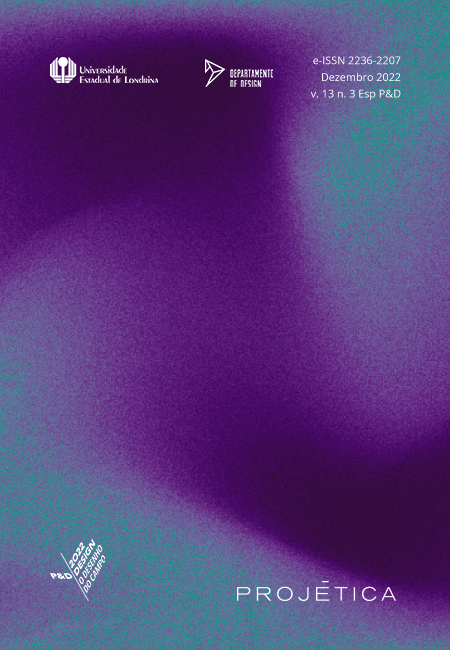Daily acts of design:
designing without projecting
DOI:
https://doi.org/10.5433/2236-2207.2022v13n3p220Keywords:
design making;, everyday acts of design;, Escola Superior de Desenho Industrial.Abstract
This article presents considerations for a critical re-evaluation of the design field arising from the intensification of a crisis in public education that hit the Escola Superior de Desenho Industrial in the years from 2016 to 2018. With salaries and scholarships suspended or delayed, professors, students, technical-administrative employees joined former students and friends of the school with the purpose of developing activities that could keep the school open. From this collective mobilization, questions have emerged about design and design education that call for a reconfiguration of practices and assumptions in the field. More specifically, they claim the qualification of daily survival acts as acts of design, of doing design without projecting and without the commitment to solutions for the future. Thus, the concepts of planning, progress and future, traditionally linked to the field, are questioned in search of alternatives to a developmentalist and rationalist future project that is problematized in several fields of contemporary theoretical production.
Downloads
References
Anastassakis, Z. Triunfos e Impasses: Lina Bo Bardi, Aloisio Magalhães e o design no Brasil. Rio de Janeiro: Lamparina Editora, 2014. DOI: https://doi.org/10.5151/design-icdhs-096
Anastassakis, Z; Martins, M. Everyday Acts of Design: Learning in a time of emergency. London and New York: Bloomsbury, 2022 (no prelo). DOI: https://doi.org/10.5040/9781350162433.ch-001
Bispo dos Santos, A. Somos da terra. Piseagrama 12, 2018, p. 44-51.
Despret, V.; Stengers, I. Women who make a fuss: the unfaithful daughters of Virginia Woolf. Minneapolis: Univocal Publishing, 2014.
Escobar, A. Designs for the Pluriverse. Radical Interdependence, Autonomy and the Making of Worlds. Durham and London: Duke University Press, 2017. DOI: https://doi.org/10.1215/9780822371816
Fry, T. Defuturing: A New Design Philosophy. London and New York: Bloomsbury, 2020. DOI: https://doi.org/10.5040/9781350089563
Fry, T.; Kalantidou, E. Design in the Borderlands. London and New York: Routledge, 2015. DOI: https://doi.org/10.4324/9781315778891
Gatt, C.; Ingold, T. From Description to Correspondence: Anthropology in Real Time. Design Anthropology Theory and Practice, edited by W. Gunn, T. Otto, R. Charlotte Smith, London and New York: Bloomsbury, 2013, p. 139-158. DOI: https://doi.org/10.4324/9781003085195-11
Haraway, D. Staying with the trouble: making kin in the Chthulucene. Durham and London: Duke University Press, 2016. DOI: https://doi.org/10.2307/j.ctv11cw25q
Haraway, D. Situated Knowledges: The Science Question in Feminism and the Privilege of Partial Perspective. Feminist Studies 14, no. 3 (1988): 575–599. DOI: https://doi.org/10.2307/3178066
Ingold, T. Correspondences. Cambridge: Polity Press, 2020.
Ingold, T. On Human Correspondence. Journal of the Royal Anthropological Institute 23, Royal Anthropological Institute, 2016, p. 9-27. DOI: https://doi.org/10.1111/1467-9655.12541
Ingold, T. The life of lines. London and New York: Routledge, 2015. DOI: https://doi.org/10.4324/9781315727240
Ingold, T. Making: Anthropology, Archaeology, Art and Architecture. London and New York: Routledge, 2013. DOI: https://doi.org/10.4324/9780203559055
Ingold, T. Being Alive: essays on movement, knowledge and description. London and New York: Routledge, 2011. DOI: https://doi.org/10.4324/9780203818336
Jones, J. C. Designing Designing. London; New York; Oxford; New Delhi; Sydney: Bloomsbury Visual Arts, 2020.
Latour, B. A Cautious Prometheus? A Few Steps Toward a Philosophy of Design (With Special Attention to Peter Sloterdijk). Proceedings of the 2008 Annual International Conference of the Design History Society, edited by F. Hackne, J. Glynne and V. Minto. Falmouth: Universal Publishers, 2008, p. 02-10.
Martins, M; Anastassakis, Z. Parachuting into the Future. Gui Bonsiepe: The Disobedience of Design. edited by L. Penin, London and New York: Radical Thinkers in Design/Bloomsbury, 2022, p. 415-422. DOI: https://doi.org/10.5040/9781350162488.0058
Mattern, S. Maintenance and care. Places Journal, November 2018. DOI: https://doi.org/10.22269/181120
Paolucci, Juliana, Esdi Aberta: design e (r)existência na Escola Superior de Desenho Industrial, dissertação de mestrado, UERJ, Rio de Janeiro, 2018.
Pratt, M. L. Arts of the Contact Zone. Profession: 1991, p. 33–40.
Souza, P. L. P. de. ESDI: biografia de uma ideia. Rio de Janeiro: Ed.UERJ, 1996.
Stengers, I. In catastrophic times: resisting the coming barbarism. Open Humanities Press/Meson Press, 2015.
Tsing, A. The Mushroom at the end of the world. On the possibility of life in capitalist ruins. Princeton and Oxford: Princeton University Press, 2015. DOI: https://doi.org/10.1515/9781400873548
Downloads
Additional Files
Published
How to Cite
Issue
Section
License

This work is licensed under a Creative Commons Attribution 4.0 International License.
Projética está licenciada sob a Creative Commons Attribution CC-BY 4.0 International. Os autores detém os direitos autorais e concedem à revista o direito de exclusividade de primeira publicação.
Os autores dos trabalhos aprovados autorizam Projética a, após a publicação, ceder seu conteúdo para reprodução em indexadores de conteúdo, bibliotecas virtuais e similares.
Os autores assumem que os textos submetidos à publicação são de sua criação original, responsabilizando-se inteiramente por seu conteúdo em caso de eventual impugnação por parte de terceiros. As opiniões emitidas pelos autores dos artigos são de sua exclusiva responsabilidade.
A revista se reserva o direito de efetuar, nos originais, alterações de ordem normativa, ortográfica e gramatical, com vistas a manter o padrão culto da língua e a credibilidade do veículo. Respeitará, no entanto, o estilo de escrever dos autores. Alterações, correções ou sugestões de ordem conceitual serão encaminhadas aos autores, quando necessário. Nesses casos, os artigos, depois de adequados, deverão ser submetidos a nova apreciação. As provas finais não serão encaminhadas aos autores.











